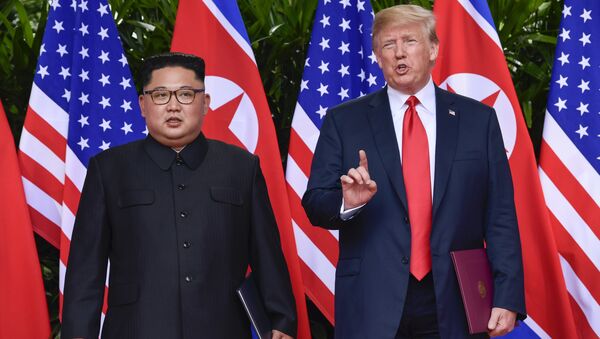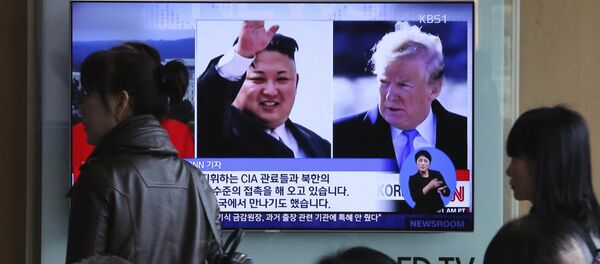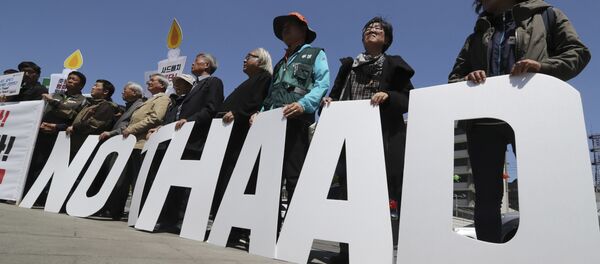US Secretary of State Mike Pompeo on Friday announced that the United States will suspend its obligations under the INF effective 2 February and will begin a six-month withdrawal process unless Russia "comes back into compliance" with the accord. Washington has repeatedly claimed that a Russian missile test in 2014 violated the agreement while Moscow has complained that US launchers on defense systems in Europe are capable of firing cruise missiles at banned ranges.
Russian Foreign Ministry spokeswoman Maria Zakharova on Friday said that the United States has so far failed to present any evidence to support allegations that Moscow has violated the INF treaty.
PYONGYANG PRIORITY
US President Donald Trump told reporters on Thursday that he will announce next week the date and location of his next summit with North Korea's leader Kim Jong Un.
Former UN High Representative for Disarmament Affairs Angela Kane told Sputnik that whether the United States deploys to Asia missiles that were banned under the INF hinges on what North Korea does.
"I think right now everything is looking at making progress with North Korea," Kane said. "So I do not think that he would actually consider deploying any missiles to Japan or South Korea."
Kane said the United States is at a "very critical moment" in the process to denuclearize North Korea.
READ MORE: Trump Expects to Meet Kim Jong-un 'Shortly' Amid 'Best Ever' Relations With DPRK
However, any future US decision on whether or not to deploy intermediate-range missiles in Northeast Asia would depend upon the outcome of this second Trump-Kim summit, Kane cautioned.
"If the situation deteriorates, there could well be the situation where Trump decides that he would like to station missiles possibly in South Korea," she said. "That really depends on what would happen in these negotiations."
Robert Winstanley-Chesters, a research fellow of Australian National University's College of Asia and the Pacific told Sputnik that the Trump administration would face political obstacles to deploying such weapons systems in the region.
"It would be politically impossible in South Korea given current efforts to engage North Korea and the current complexion of the South Korean government," Winstanley-Chesters said.
As far as Tokyo, he added, Japanese Prime Minister Abe will be hard-pressed to get buy-in domestically for US deployments of intermediate-range weapons systems.
"Even with the Abe government's desire for [a] more robust Japanese military I believe the societal reaction to the installation of short and intermediate missile technology would mean that it would not be possible," he noted.
THREAT TO CHINA
The United States has often pointed to China’s missile development programs as a valid reason for leaving the INF treaty. The Trump administration believes it is unwise to limit development of INF-banned missiles if Beijing, who is free of similar restrictions, continues to build them.
READ MORE: N Korea to Continue Working on Creating 'Permanent Peace on Peninsula' — Envoy
Kane said, while Washington is reluctant to undermine the North Korea talks, Trump might consider deploying intermediate-range missiles against China especially if he cannot reach the kind of trade agreement he desires with Beijing.
Kane expressed the hope that both Washington and Beijing would refrain from intermediate-range missile deployments in Northeast Asia.
"I hope that is not going to be the case, because no one is served – neither Russia, the Korea's, the Korean peninsula or Japan – with an increasing hostility in the Asia-Pacific region," she advised.
"It would be an absolute crossing of many of China's red lines and a real challenge to China's sense of its sphere of influence in the region," Winstanley-Chesters said.
Japan’s Foreign Minister Taro Kono suggested on Friday that if the United States does withdraw from the INF Treaty, it should be replaced with another deal that would cover not only Russia and the US, but China and other countries concerned as well, NHK broadcast reported.
READ MORE: Japan Suggests Creating New Arms Control Deal If US Quits INF Treaty — Reports
US President Donald Trump said earlier on Friday that he hopes to establish a new agreement that will be "much better" and will include more countries than are party to the INF Treaty.
"I hope that we are able to get everybody in a very big and beautiful room and get new treaty that would be much better", Trump told reporters at the White House.
The INF Treaty was signed by the Soviet Union and the US in 1987, and provides for the elimination of all nuclear-armed ground-launched ballistic and cruise missiles, along with their launchers, that operate at ranges of between 500-1,000 kilometres (short-range) and 1,000-5,500 kilometres (intermediate-range).





